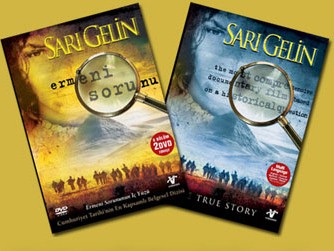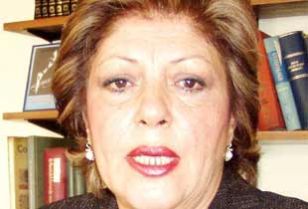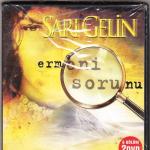The General Staff of the Turkish Army has prepared a six-part “documentary”, which was sent to all primary schools through the province authorities of the Ministry of Education. The DVDs are to be shown to children “at a convenient time”, and schools are to report back on the effects of the film by 2 March, so a letter sent to schools by the Ministry in January.
One of Turkey's most controversial issues
 The film is named after a well-loved folk song, “Sarı Gelin” (Blonde Bride), a song whose melody is known in Turkey, Azerbaijan and Armenia, yet, so the vehement critics, the film has nothing to do with promoting intercultural understanding.
The film is named after a well-loved folk song, “Sarı Gelin” (Blonde Bride), a song whose melody is known in Turkey, Azerbaijan and Armenia, yet, so the vehement critics, the film has nothing to do with promoting intercultural understanding.
The full title of this “documentary” is “Sarı Gelin: The Inside Story of the Armenian Problem”, and it was sent out to primary schools in June 2008.
It deals with the events of 1915, when, so many Armenians and also an increasing number of Turks say, millions of Armenian citizens of the Ottoman Empire were forcibly sent into exile across to Syria. Definitions of the event range from a genocide (i.e. a deliberate plan to eradicate an ethnic group) to claims that the government was at the least negligent in letting so many people starve, die of exhaustion or be killed by gangs. The Turkish official discourse has long been to deny any wrongdoing, and rather blame nationalist Armenian gangs for causing upheaval in the Ottoman Empire and killing Turkish civilians.
A recent rapprochement between Turkish President Abdullah Gül and Armenian Serzh Sargsyan, as well as an initiative by Turkish intellectuals to apologise for the events of 1915 seemed to be indications of a lessening of polarisation. However, critics of this “documentary” say that it reiterates the Turkish nationalist stance.
"A generation fed on hatred"
The education trade union Eğitim-Sen has demanded that schools immediately stop showing this film. Trade union leader Zübeyde Kılıç told bianet that their report on the film would be published within a week, and that they may go to court in order to prevent further screenings at schools.
According to Kılıç, the film would teach 12 million children, aged 6-14, to hate Armenians and anyone who is different. It would “create a generation fed on hatred.”
She added, “These children are at an age when they accept information without interpreting it, when they accept what they are told as the truth, and when things are stored in their memory. It will be impossible for a child watching this film not to feel hatred for Armenians.”
“As for the Armenian children (i.e. citizens of Turkey who will also be exposed to this film), they may be marginalised or discriminated against afterwards. This worry may lead to them hiding their identities.”
Kılıç has called on an education which would teach the events of 1915, as well as other controversial parts of Turkey’s history, in a way that would heal wounds. “But this film encourages conflict.”
"Human rights violation"
The History Foundation has also denounced the film as propaganda rather than a documentary. The foundation is currently working on a project to identify human rights violations in school books, and argues that this film represents just such a violation. It has also called on the Ministry of Education to halt the viewings.
The foundation added, “This documentary is using a language of hostility and discrimination to sow seeds of hatred in a society where a hostility towards Armenians exists already. The ‘justified reasons’ for this hostile attitude towards people who are ‘not one of us’ is built on manipulative and selective ‘arguments’ put forward in the film. The young pupils watching this film will accept those claims as the truth.”
Societal peace needs to be promoted
The History Foundation further said, “All these children and their families are citizens with equal rights in this country. It should be expected from the Ministry of Education that it would respect such sensitivities in its practices. A safe environment, and societal peace, can only be created when education practices are in tune with such an understanding of citizenship. Damaged children’s brains can only stand in the way of societal peace.”
Armenian schools worried
Aris Nalcı, a writer for the Turkish-Armenian newspaper Agos, reports that schools have started showing the film. He says that the Armenian schools, which have also received the DVDs, are worried. Some heads of school have said that their teaching staff watched the film and decided that it would create traumas among children.
Images of mass graves and bones for children
The journalist cites psychologist Asist. Prof. Dr. Serdar Değirmenoğlu, who says that children at that age would not be possible to recognise bad propaganda material. The militarist tone of the film is supported by images of mass graves, bones and skulls. Old men, who are calculated to evoke feelings of sympathy, are interviewed. The psychologist expressed his hope that the unsuitability of such a film for such an age group would be realised. (TK/AN/AG)









